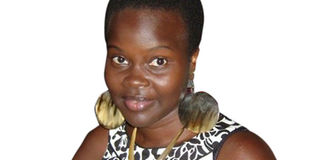Poetry Awards return

Beverly Nambozo, founder and director, BN Poetry Foundation.
What you need to know:
Babishai Niwe Poetry Awards. The award started in 2008 as a small prize for only Ugandan women, but last year, it was expanded to a continental award for both men and women. The call for submission of poems starts on January 15.
In 2008, Beverly Nambozo started a poetry competition to create a mouthpiece for and award women and girls through spoken and written word. Over the past three years including last year, the first 10 winners attend mentoring workshops at various festivals around the continent including Kampala and have been published in anthologies and participated in many readings. In addition to the awards this year, an anthology about Kampala is in the making. Nambozo shares with Saturday Monitor what Babishai Niwe (BN) Poetry Award’s journey has been like.
Describe the success journey of the BN poetry Awards.
The BN Poetry Award is now continental. Currently, it’s the only annual poetry award for Africans, whose secretariat is based on the continent. The award started in 2008 as a small prize for only Ugandan women, until 2014 when we extended it to the continent and Kenyan poet, Tom Jalio was awarded $1,000 (about Shs2.8m).
As a strategic team, we decided that not only should poets be rewarded graciously for their work but they should also receive mentorship and have their works published. There is now a foundation in place, the Babishai Niwe (BN) Poetry Foundation. The Foundation coordinates the annual poetry competition, it also published anthologies. A Thousand Voices Rising, an anthology of contemporary African poetry, was well received and voted among the top 100 books from 2010 to 2014, in a survey conducted by This is Africa.
Last year, we began upcountry outreaches and in 2015, we’ll be holding a poetry festival in Kabale as well as a poetry procession to Nakuru. These are all signs of growth. In addition, we held our first poetry festival which coincided with the launch of the first poetry library, an in initiative of the African Poetry Book Fund in Nebraska.
What criteria do you follow to award the best poetry?
There is a team of judges with different taste, different professional artistic and poetry backgrounds and living in various parts of the world. Their main criteria would be language and style and then other factors like the message, diction and uniqueness would come in. It’s important for several judges to be part of the panel otherwise the selections would be subjective.
Do you follow themes? What becomes of the pieces after the awards?
We followed themes for five years when it was an award for Ugandan women but for now, it’s open.
When is the next edition of the competitions starting or ending?
The next call for submissions of the BN Poetry Award 2015 will begin on January 15 and end on May 15.
What inspired the challenge anyway?
It was inspired by the need to recognise, re-emphasise poetry’s importance and also reward hard-working poets.
What challenges have you faced since you started organising the BN poetry competition?
It’s largely resource mobilisation and having a larger impact on the continent. This year, we want to participate in as many festivals continent-wide as possible and establish offices in many countries. We are glad to be unveiling our new board and some confirmed members are Ehab Ibrahim, cultural attaché at the Embassy of Sudan in Uganda, Sahro Ahmed Koshin, Somali poet and founder of Puntland Women Writers Association, Richard Ali, Chief Operations Officer at Parrésia Publishers in Nigeria, Graham Mort, Professor and head of Transcultural Literature at Lancaster University and Remi Raji, Professor at Ibadan University and President of Association of Nigerian Authors.
What is the future for poetry in Uganda?
Poetry has always been the future, the present and the past. Several groups here are running successful poetry readings and performances and visiting schools country-wide. I strongly believe that there is a lot more emphasis on documenting and publishing poetry in both audio and print, in local languages, which is exciting, because lots of good work disappears without documentation. In Uganda, poets are going to be largely recognised as the opening and closing acts of many public spaces, as opposed to a tiny fragment in a programme. I invite readers and writers to join us on Friday February 13 at 10am to a Valentine’s reading of their poems entitled, Love, Romance nebigeenderako mu Kampala. It will take place at 32° East | Ugandan Arts Trust, in Kansanga.
What is the future for the Bibishai Niwe? Why the change to the latter?
The name Babishai Niwe, which means Creating with you, symbolises its growth from merely a Ugandan award for women, to a continent-wide award. It is the inspiration from our foremothers that began Uganda Women Writers Association, which gave many of us the steed to tread where no one ever has. 2015 is going to be a poetry year like no other in Africa. And it will only get better after that.




